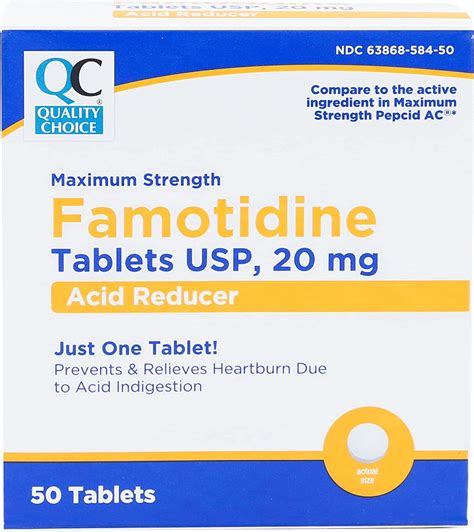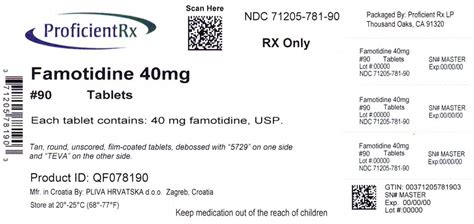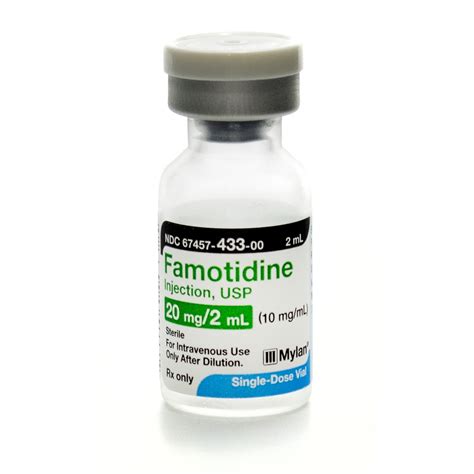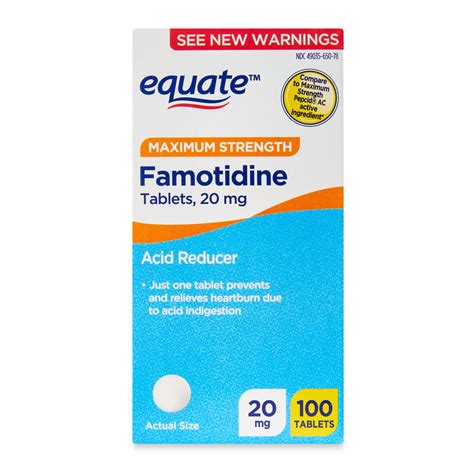Intro
Learn the proper Famotidine 20mg dosage for heartburn relief, acid reflux treatment, and stomach ulcer prevention, with guidance on usage, interactions, and side effects for safe and effective medication management.
Famotidine is a medication that has been widely used for the treatment of various gastrointestinal conditions, including gastroesophageal reflux disease (GERD), Zollinger-Ellison syndrome, and peptic ulcer disease. The 20mg dosage of famotidine is one of the most commonly prescribed strengths, and it's essential to understand how to take it correctly to achieve the best possible results. In this article, we'll delve into the world of famotidine, exploring its benefits, working mechanisms, and providing a comprehensive guide on how to use the 20mg dosage effectively.
The importance of understanding the correct dosage and administration of famotidine cannot be overstated. Taking the wrong dose or failing to follow the prescribed regimen can lead to reduced efficacy, increased risk of side effects, or even worsening of the underlying condition. As such, it's crucial to consult with a healthcare professional before starting treatment with famotidine, especially if you're unsure about the correct dosage or have any pre-existing medical conditions.
Famotidine works by reducing the amount of acid produced in the stomach, which helps to alleviate symptoms such as heartburn, regurgitation, and stomach pain. The medication belongs to a class of drugs known as histamine-2 (H2) blockers, which work by blocking the action of histamine, a chemical that stimulates the production of stomach acid. By reducing acid production, famotidine helps to heal and prevent damage to the esophagus, stomach, and duodenum, promoting faster recovery and improving overall quality of life.
Introduction to Famotidine 20mg

Benefits of Famotidine 20mg
The benefits of famotidine 20mg are numerous, and the medication has been shown to be effective in: * Reducing stomach acid production, alleviating symptoms of heartburn, regurgitation, and stomach pain * Healing and preventing damage to the esophagus, stomach, and duodenum * Improving digestion, reducing bloating, and promoting regular bowel movements * Enhancing overall quality of life, allowing patients to enjoy food and activities without discomfort or pain * Being a relatively safe and well-tolerated medication, with a low risk of serious side effectsHow to Take Famotidine 20mg

Common Side Effects of Famotidine 20mg
While famotidine 20mg is generally well-tolerated, some patients may experience common side effects, including: * Headache, dizziness, or drowsiness * Diarrhea, constipation, or stomach cramps * Nausea, vomiting, or loss of appetite * Fatigue, weakness, or muscle pain * Rash, itching, or hives (rare)Famotidine 20mg Interactions and Warnings

Precautions and Contraindications
Famotidine 20mg is not suitable for everyone, and certain patients may need to take precautions or avoid the medication altogether. These include: * Pregnant or breastfeeding women, who should consult their healthcare professional before taking famotidine * Patients with kidney or liver disease, who may require dose adjustments or monitoring * Patients with allergies to famotidine or other H2 blockers * Patients taking certain medications, such as ketoconazole or itraconazole, which may interact with famotidineFamotidine 20mg Dosage and Administration

Tips for Taking Famotidine 20mg
To get the most out of your treatment with famotidine 20mg, follow these tips: * Take the medication at the same time every day, to establish a routine and improve adherence * Keep the medication in a cool, dry place, away from direct sunlight and moisture * Do not share the medication with others, as this may lead to overdose or underdose * If you experience any side effects or concerns, consult your healthcare professional promptlyFamotidine 20mg and Pregnancy

Breastfeeding and Famotidine 20mg
Famotidine 20mg is excreted in breast milk, although the amounts are generally considered to be low. However, breastfeeding women should consult with a healthcare professional before taking the medication, as it may affect the baby's stomach acid production or increase the risk of side effects.Famotidine 20mg and Children

Geriatric Use of Famotidine 20mg
Famotidine 20mg can be used in elderly patients, although the dosage and administration may need to be adjusted based on the patient's kidney or liver function. Elderly patients should be monitored closely for side effects, such as confusion, dizziness, or falls, which may be more common in this age group.Famotidine 20mg Overdose and Interactions

Treatment of Famotidine 20mg Overdose
If an overdose is suspected, the patient should be taken to the emergency department immediately. Treatment may involve: * Gastric lavage or activated charcoal to reduce absorption * Supportive care, such as fluids and monitoring of vital signs * Administration of antidotes, such as naloxone or flumazenil, if necessaryFamotidine 20mg FAQs

What is the usual dose of famotidine 20mg?
+The usual dose of famotidine 20mg is 20mg once or twice a day, depending on the patient's condition and response to treatment.
Can I take famotidine 20mg with other medications?
+Famotidine 20mg can interact with other medications, such as antacids, anti-inflammatory medications, and blood thinners. Patients should consult their healthcare professional before taking famotidine with other medications.
Is famotidine 20mg safe during pregnancy?
+Famotidine 20mg is generally considered safe during pregnancy, but patients should consult their healthcare professional before taking the medication.
Can I take famotidine 20mg if I have kidney or liver disease?
+Patient with kidney or liver disease should consult their healthcare professional before taking famotidine 20mg, as the dosage and administration may need to be adjusted.
What are the common side effects of famotidine 20mg?
+Common side effects of famotidine 20mg include headache, dizziness, diarrhea, constipation, and nausea.
In conclusion, famotidine 20mg is a commonly prescribed medication for the treatment of various gastrointestinal conditions. By understanding the benefits, working mechanisms, and potential interactions of famotidine, patients can take the medication safely and effectively. If you have any questions or concerns about famotidine 20mg, don't hesitate to reach out to your healthcare professional or leave a comment below. Share this article with others who may benefit from the information, and let's work together to promote digestive health and well-being.
